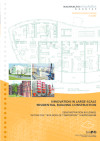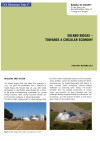Suchergebnisse
Development of a GIS-Onlineplatform for the forestry
Development of a GIS-Onlineplatform for the forestry which enables its users to carry out all necessary tasks online: the complete data of forest work can be viewed, changed and newly calculated at any time, including the ability to control machine-use more efficiently right at the beginning of use.
IEA 4E Annex: Mapping and Benchmarking
In the Mapping and Benchmarking work (formerly M&B Annex) the following product were analyzed: domestic refrigeration (update), dishwashers, settop boxes, transformers and lights, for which this report includes most relevant results and the related M&B publications. It also introduces the 2015-2016 work on motors, liquid chillers, and water boilers.
Pilot-Biogas plant consisting of prefabricated units
Construction of a biogas tank built of prefabricated reinforced concrete elements, erected and operated at an existing biogas plant in Bruck an der Leitha. The precast concrete technology promised a lot of advantages but also posed a lot of questions that had to be solved. These problems considered especially the sealing method and the general construction with precast concrete elements.
EmPOWERing All: Inclusive Energy Transitions
24 April 2024, 9:30 - 17:30h
Festsaal (BMK), Radetzkystraße 2, 1030 Vienna / online
This event offers a unique opportunity for key stakeholders in the field of inclusive and sustainable energy transition to come together and learn about the research results and actions of the IEA UsersTCP - Gender and Energy Task and discuss future developments and challenges in this field.
Energy research expenditure - corporate sector in Austria 2021

759.8 million in research expenditure was allocated to the topic of energy by domestic companies in 2021. This figure was 16% higher than the comparable figure from the 2019 survey. The report contains detailed figures and analyses of various technologies with regard to company and public R&D investments.
6/2024
A. Indinger, F. Bettin
Herausgeber: BMK, 2024
Deutsch, 66 Seiten
6th SOPHIA Photovoltaic Reliability Workshop
28. - 29. April 2016
AIT Tech Base, 1210, Giefinggasse 2Vienna, AT
The 2016 workshop will feature reliability aspects in connection to building integration with focus on innovative functional materials and components as well as detailed discussions on PV system reliability.
Innovation in LARGE-SCALE

Demonstration buildings within the "BUILDING OF TOMORROW" subprogram.
4/2006
Herausgeber: BMVIT
Englisch, 6 Seiten
Downloads zur Publikation
Workshop: CCS in Industry - Results from IEAGHG
28. April 2014
Hotel De France, "Salon Franz-Joseph", Schottenring 3
1010 Vienna, AT
At this Workshop, results from analytical work on CCS carried out by the IEA Greenhouse Gas R&D Programme were presented and discussed. The Focus was on industrial processes, where the production of cement and steel and also oil refining offer considerable options to reduce THG emissions.
Workshop: Solar heat for industrial processes
31. Mar 2004
Steiermarkhaus, Place des Gueux 8, B-1000 BrusselsBrussels, BE
A joint Task of the IEA Solar Heating and Cooling Programme and the IEA SolarPACES Programme was in November 2003 initiated on "Solar Heat for Industrial Processes". 25 experts from 8 countries (5 EU countries + Czech Republic, Mexico and Australia) participate in this task.
IEA-4E Bright Spark Newsletter, September 2015

Herausgeber: IEA - 4E Bright Sparks
Englisch, 4 Seiten
IEA-4E Bright Spark Newsletter, September 2014

Schwerpunktthemen des Newsletters sind das Buch Mehr Daten weniger Energie, der Neueste Annex Electronic Devices and Networks, sowie die Aktualisierungen des EMSA und des SSL Annex.
Herausgeber: IEA - 4E Bright Sparks
Englisch, 5 Seiten
Solrød Biogas - Towards a circular economy (2015)

Die Studie zeigt den Fall der Solrød Biogasanlage. Ein innovatives Konzept, bei dem unter anderem Makroalgen vergoren werden, und die Nährstoffströme in das Meer gezielt reduziert werden, um die landschaftliche Qualität für den Tourismus zu behalten. Des weiteren werden Industriereststoffe verarbeitet, sodass ein insgesamt stimmiges Konzept entsteht.
Herausgeber: Bioenergy Task 37
Englisch, 4 Seiten
Downloads zur Publikation
Wood Plastic Composites - Development of an extrusion tool
Development of a new generation extrusion tool for a wood plastic composite. This material will be developed in a second project an should show a fiber content of 60 - 85%. Important is a high profile quality as well as a high output to ensure an economical production.
smart façade - energy potential of adaptive façade systems
A specially developed simulation model is employed to ascertain the energetic potential of adaptive façade systems. The dynamic behavior of the physical properties of the adaptive façade system reacts to both internal and external changing conditions. The goal was the development of an adaptive façade, which helps provide maximum comfort for the building occupants with minimum energy consumption.
Webinar: IEA AMF Annex 56 - Methanol as Motor Fuel
26. October 2020
Online, AT
This webinar will explore some of the key reasons why methanol can be an alternative fuel aligned with the priorities of today on the energy and climate fronts.
Film "S-HOUSE - Schiestlhaus - Renaissance of Clay"

Documentary about two unique buildings
Englisch
IEA AFC Annex 33: Stationary Applications (Working period 2017 - 2019)
The main objective of Annex 33 is to support the technology development of key components and systems. Market implementation and transformation will be supported by the analysis and development of the necessary political framework and instruments. The current technological, economic and political barriers are to be identified, solutions developed and the barriers gradually removed.
IEA AFC Annex 35: Fuel cells for portable applications (Working period 2017 - 2019)
The aim of Annex 35 is the information exchange on the status and new developments of portable fuel cell systems and comprises the development and manufacture of membrane electrode assemblies (MEAs) all the way through to system components such as electronic converters or gas supply units. In addition the setup and configuration of hybridized systems and the key topics of secure operation, codes and standards are of interest.
IEA AFC Annex 31: Polymer electrolyte membrane fuel cell (Working period 2017 - 2019)
Task 31 is a research and development oriented Task with the objective to contribute to the identification and development of techniques and materials to reduce the cost and improve the durability of polymer electrolyte fuel cells (PEFCs).
Sustainable construction of objects as a product service
Project of a Carinthian plant construction and manufacturing company. They plan to establish a new business division "sustainable construction of premises". This division shall offer a service package for housing, stores, and industrial production sites. This service shall be developed using the approach of RISP.
